
Should High School Students Be Required to Take Algebra? Debating the Matter in Class Using SPontaneous ARgumentation
A debate has broken out over the past few years in (and beyond) education circles over whether algebra should be a high school graduation requirement. The controversy in its current iteration was fueled when the Common Core elevated algebra to a privileged position in secondary math education. Then Secretary of Education Arne Duncan made the case for the standards’ commitment to algebra in a 2011 speech to the National Council of the Teachers of Mathematics.
In recent years, it has become increasingly clear to the country — not just to you guys as teachers — that algebra is a key, maybe the key, to success in college. Students who have completed Algebra II in high school are twice as likely to earn a degree as those who didn’t. Algebra teaches students reasoning and logic leading to academic success not just in math but across the curriculum.
But for every strong proponent of the high school algebra requirement, like Secretary Duncan, there has been a detractor who has questioned the applicability of the kind of thinking that algebra demands, and the wisdom of making every single high school student master it. Two of the most vocal critics have been City University of New York political science professor Andrew Hacker, author of The Math Myth, and novelist and sometimes social commentator Nicholson Baker.
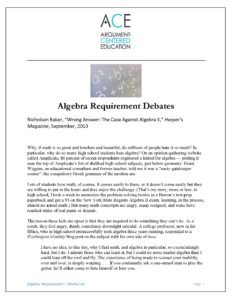
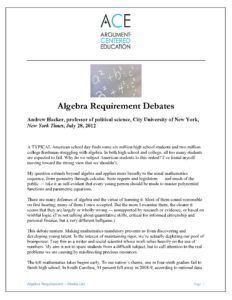
These two edited pieces are both on the negative side of this debatable issue:
Should algebra be a high school graduation requirement?
They both appear, along with a slew of other sources on both sides of the issue (so that the sources are even in number, for the affirmative and negative) on the Algebra Requirement Media List.
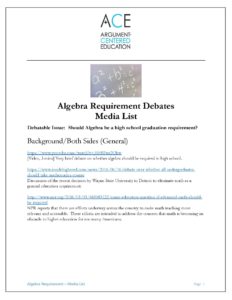
An example of an affirmative source is a short excerpt from a lecture (about 4 minutes) by Stanford University mathematics professor Keith Devlin.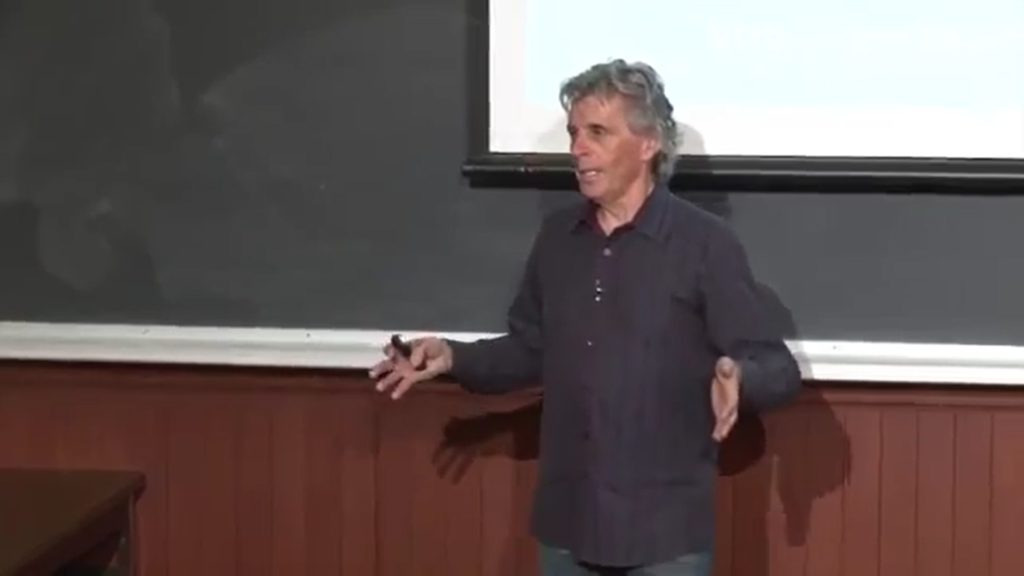
Students at Argument-Centered Education partner schools have been debating this issue using the SPontaneous ARgumentation format. An example of an Implementation Plan that we have designed with one such school is this:
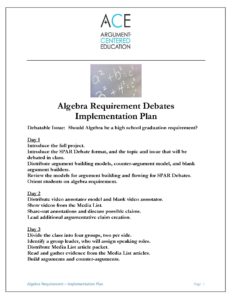
One challenge that students have experienced in this argument-based project has been formulating argumentative claims to support their position on the issue. This challenge is, of course, far from unique to this issue or project; students learning academic argumentation skills frequently find the thinking through and formulation of discrete, focused, clear, and directed claims difficult. Less experienced, less developed students often want to blend all of their ideas into one large and amorphous “claim,” and they avoid or resist applying a kind of organizational discipline to their thinking that produces distinct reasons (that when they are evidenced become arguments) that develop and support their overall position.
But, though it’s not a unique challenge, it is one that this project has teased out. We have found it useful to produce a set of argumentative claims with larger groups or whole classes, after they have begun their reading and viewing on the issue, but before they have begun annotating and capturing their evidence to support their argumentation. These discussions can be prompted by Quick Claim mini-activities, in which students try to formulate three separate and focused reasons for their side of the issue in 5 minutes, sharing those out to the larger group or full class.
Here is a sample set of claims that we have developed and then used fruitfully with students as they’ve assembled and deployed arguments on the algebra requirement issue.
Affirmative Claims
Algebra uniquely teaches logical reasoning and critical thinking skills.
Algebra is widely required for college graduation, so high school algebra is an essential preparation for success in college.
Challenging high school students with more advanced and demanding curriculum helps them develop into young adults.
The problems with algebra instruction can be fixed by adopting an improved algebra curriculum and by providing high school math teachers with more and better training.
The United States is already behind most of the rest of the industrialized world in math, so we shouldn’t try to teach less math.
Negative Claims
Algebra is not necessary in the real world or in the vast majority of careers.
Millions of high school students fail high school algebra every year.
The high school algebra requirement negatively affects lower-income and minority students much more than affluent or white students.
The algebra requirement stunts the development of many other non-math talents and abilities.
There is nothing uniquely valuable about algebra.

